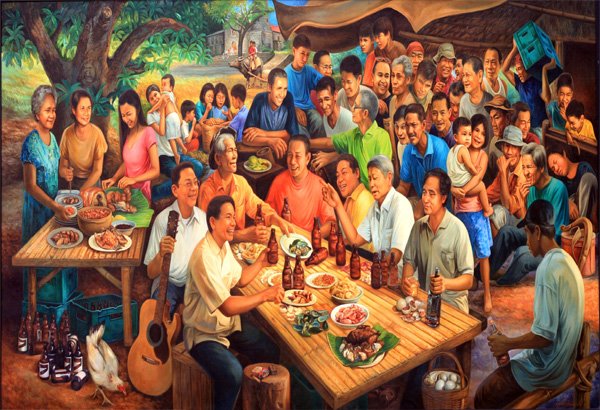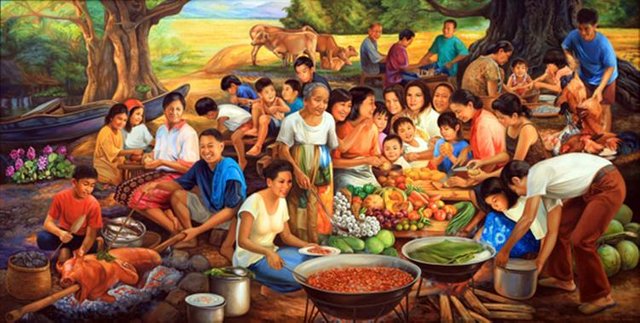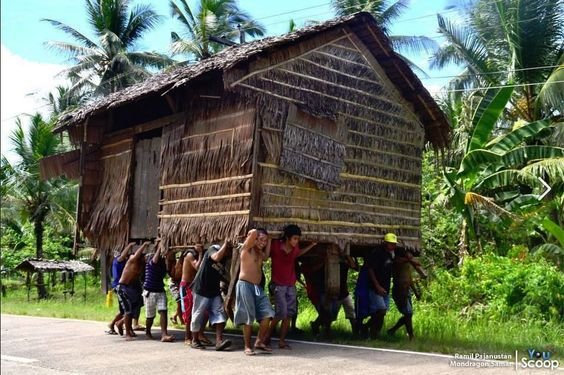Filipinos are Family-Oriented Wherever They Go
Filipinos are Family-Oriented Wherever They Go

Image Source
Family is of the greatest asset among the Filipinos. It is the wealth they can never exchange to anything else including money. Basically, they are, at all times, emotionally attached to their families even after marriage and separation from their parents. Many would think that Filipino are economically dependent on their mothers as they tend to give their children to the custody of their parents. For some reason, it really is, but as a respect to tradition, attachment to families is absolutely a Philippine culture. Culture as it is, and it cannot be argued. It does not mean that the children are uncapable to live independently, but it is a form of love for parents.
Respect to the Elders
Like neighboring Asian countries, the Philippines has this kind of culture that gives respect to the elderly people by gestures or by the words they use before and after the name of an older person. Being younger than someone else means a responsibility of showing respect. Otherwise such as calling them by their first name is considered rudeness or one can be mouthed as not being taught the good manner by the parents. It is not limited to relatives only. It is applied to every human being.
Filipino children bow down their heads as they hold the hands of their grandmothers and grandfathers towards their forehead and say “mano po, lola, mano po, lolo,“ a means of giving respect to the elders. In the Philippines, one cannot be called a good person if he or she does not do it. Children even get scolded if they do not practice it, would eventually be called black sheep or rebels, at worst. That is why grandparents do not worry about being old and being neglected because the children are highly expected to take care of them. Otherwise, their neighbors would the ones to curse them.

Image Source
Extended Family
By definition, an extended family is a bunch of people with the same bloodline living together in a single place like a home, a compound, or a community. It can be thought as a territory ruled by a clan or simply by a family, but it is not strictly limited to a single bloodline. It is just that due to the growing family and the culture of emotional attachment to family members, Filipinos would inevitably establish something like it. Even those who are farther than being relatives are being taken care of genuinely. As long as someone is biologically connected, he or she is part of their struggle.
For them, it is normal to stay at parents’ home even after reaching 18 years of age. Unlike other cultures, Filipinos have extended families consisting of grandparents, parents and the siblings. Even if the kids already have jobs or are already professionals, they stick to their parents. Married couples also live with their parents. It can be with the men or women’s parents. There are also families who have established a community of relatives and families especially among Muslims in Mindanao, Philippines. Whatever and wherever it can be, the only important thing to them is to secure the attachment of families.
Problem of One, Problem of All
It is an advantage among Filipinos to stay attached to families and relatives. Families celebrate together as much as they share together the problem of a family member. All the members of the family would find way to solve the problem of one member like borrowing money, looking for backers, or soliciting funds among them until the problem is solved. It is also culturally mandatory to them to help the needy relatives or else one could be cursed as evil-minded or selfish. A child is lucky when he or she has rich relatives that he or she could ask for money to pay his or her tuition fees at school and the like. One cannot afford to eat spaghetti when there is another family member who has nothing to eat, so the spaghetti of one is the spaghetti of all.

Image Source
Obligatory Family Responsibility
Although there is no legal law that secures full obedience of this responsibility, Filipinos are totally mindful that they have to help their younger brothers and sisters, parents, grandparents, and even aunts and uncles in times of poverty. That gives the reason why parents punish their children if they do not go to school because they want them to be successful in life in the future and to help them in return. They are expected to build their parents decent homes and live comfortably until death.
Filipinos value family so much that they die without them on their sides. As much, they keep them on their sight by helping them as much as they can to prevent loved ones from leaving them. They prioritize their family more than their profession. Whenever a family member is in danger, someone else from a family tends to leave classes, work, or important meeting just to reach him or her out and is willing to sacrifice himself or herself for the family. This is always in the minds of every Filipino to act as parents and do the similar job for them, and eventually when it is witnessed by their young ones, this will be inherited by them. And the cycle remains.
This type of relationship with parents among Filipinos is unique in the world. Although it can also be seen somewhere else like in South Korea or in Vietnam, but the Filipinos have distinct characteristics of what it is like to take care of a family. Filipinos are loving, aren’t they? Filipinos treat family better than others do. Why? Because among other Asian countries, Filipinos suffer more from poverty, and economic asset is a key to living assurance for family members, but it is not a thing for Filipinos. Even the beggars hold their family so tight. They would kill someone who attempts to kidnap a younger family member or those who offer adoption to their hungry children.

Image Source

Nice post @staphph this is one inspiring in everyone
wish to be like this all family or any association in the Philippines, just leave the road to create the relics of each family member, sometimes becomes selfish in the power not at all but of others.